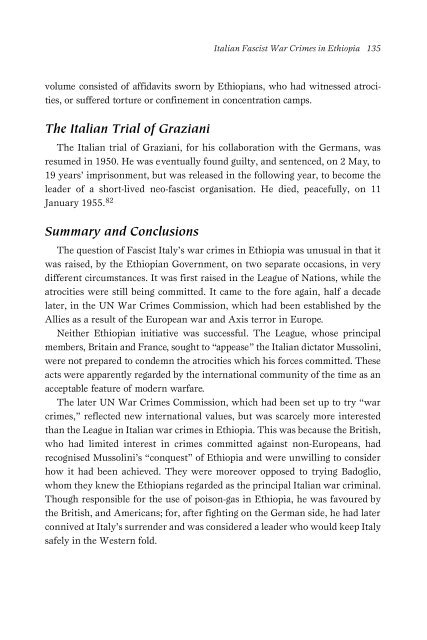Italian Fascist War Crimes in Ethiopia - Societa italiana di storia ...
Italian Fascist War Crimes in Ethiopia - Societa italiana di storia ...
Italian Fascist War Crimes in Ethiopia - Societa italiana di storia ...
Create successful ePaper yourself
Turn your PDF publications into a flip-book with our unique Google optimized e-Paper software.
<strong>Italian</strong> <strong>Fascist</strong> <strong>War</strong> <strong>Crimes</strong> <strong>in</strong> <strong>Ethiopia</strong> 135<br />
volume consisted of affidavits sworn by <strong>Ethiopia</strong>ns, who had witnessed atro c i-<br />
ties, or suffered torture or conf<strong>in</strong>ement <strong>in</strong> concentration camps.<br />
The <strong>Italian</strong> Trial of Graziani<br />
The <strong>Italian</strong> trial of Graziani, for his collaboration with the Germans, was<br />
resumed <strong>in</strong> 1950. He was eventually found guilty, and sentenced, on 2 May, to<br />
19 years’ imprisonment, but was released <strong>in</strong> the follow<strong>in</strong>g year, to become the<br />
leader of a short-lived neo-fascist organisation. He <strong>di</strong>ed, peacefully, on 11<br />
January 1955. 82<br />
Summary and Conclusions<br />
The question of <strong>Fascist</strong> Italy’s war crimes <strong>in</strong> <strong>Ethiopia</strong> was unusual <strong>in</strong> that it<br />
was raised, by the <strong>Ethiopia</strong>n Government, on two separate occasions, <strong>in</strong> very<br />
<strong>di</strong>fferent circumstances. It was first raised <strong>in</strong> the League of Nations, while the<br />
atrocities were still be<strong>in</strong>g committed. It came to the fore aga<strong>in</strong>, half a decade<br />
later, <strong>in</strong> the UN <strong>War</strong> <strong>Crimes</strong> Commission, which had been established by the<br />
Allies as a result of the European war and Axis terror <strong>in</strong> Europe.<br />
Neither <strong>Ethiopia</strong>n <strong>in</strong>itiative was successful. The League, whose pr<strong>in</strong>cipal<br />
members, Brita<strong>in</strong> and Fra n c e, sought to “appease” the <strong>Italian</strong> <strong>di</strong>ctator Mussol<strong>in</strong>i,<br />
we re not pre p a red to condemn the atrocities which his forces committed. These<br />
acts we re apparently re g a rded by the <strong>in</strong>ternational community of the time as an<br />
acceptable feature of modern wa r f a re.<br />
The later UN <strong>War</strong> <strong>Crimes</strong> Commission, which had been set up to try “war<br />
crimes,” reflected new <strong>in</strong>ternational values, but was scarcely more <strong>in</strong>terested<br />
than the League <strong>in</strong> <strong>Italian</strong> war crimes <strong>in</strong> <strong>Ethiopia</strong>. This was because the British,<br />
who had limited <strong>in</strong>terest <strong>in</strong> crimes committed aga<strong>in</strong>st non-Europeans, had<br />
recognised Mussol<strong>in</strong>i’s “conquest” of <strong>Ethiopia</strong> and were unwill<strong>in</strong>g to consider<br />
how it had been achieved. They were moreover opposed to try<strong>in</strong>g Badoglio,<br />
whom they knew the <strong>Ethiopia</strong>ns regarded as the pr<strong>in</strong>cipal <strong>Italian</strong> war crim<strong>in</strong>al.<br />
Though responsible for the use of poison-gas <strong>in</strong> <strong>Ethiopia</strong>, he was favoured by<br />
the British, and Americans; for, after fight<strong>in</strong>g on the German side, he had later<br />
connived at Italy’s surrender and was considered a leader who would keep Italy<br />
safely <strong>in</strong> the Western fold.

















